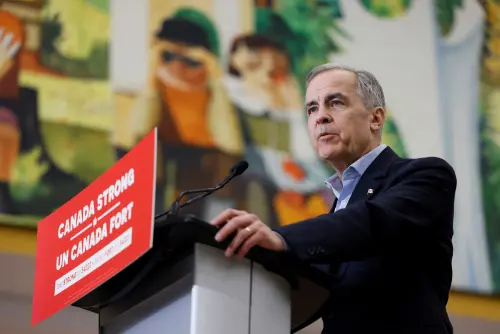Canadian Prime Minister Mark Carney's decision to call for an election on April 28 could limit his ability to respond decisively if the United States imposes additional tariffs. With campaigning underway, the government is subject to a caretaker convention, allowing for routine business but discouraging major policy decisions.
This election occurs at a particularly sensitive time for Canada, amid threats from U.S. President Donald Trump regarding tariffs and comments about annexing Canada, which Carney referred to as "the most significant of our lifetimes."
While ministers retain their positions, nearly all aides were required to stop using work emails and cell phones as soon as the election was announced. This situation raises concerns about potential U.S. tariffs on Canadian imports, which are scheduled for April 2 and would follow the 25% tariffs imposed in March on Canadian steel and aluminum.
The caretaker convention permits the government to address urgent matters, allowing Canada to fulfill existing commitments, although further retaliation may be challenging. Foreign Minister Melanie Joly confirmed in an interview that Canada could implement previously announced measures during the election, stating, "Yes, of course, because ultimately we are the government ... our job is to defend the national interest."
However, engaging directly with Trump, traveling to Washington, or proposing new countermeasures against U.S. tariffs could expose Carney to criticism from opposition parties, who might accuse him of leveraging his office to enhance his political standing during the campaign.
Philippe Lagasse, a constitutional expert at Carleton University, noted, "I anticipate that during the actual election, people will be a bit more circumspect, but it depends significantly on the willingness of political actors to restrain themselves."
When asked why he called an election amidst a tariff dispute, Carney explained that he required a mandate to manage Canada's economy and negotiate effectively with Trump.
In a similar context, Conservative Prime Minister Stephen Harper faced criticism during the 2015 campaign when he announced Canada's participation in a transpacific trade pact, with opposition leader Thomas Mulcair condemning the move as unfair. Despite the controversy, Harper lost the election.
During a February election campaign in Ontario, Premier Doug Ford was criticized for campaigning against tariffs in Washington, yet he secured reelection.
Andrew McDougall, an assistant professor of political science at the University of Toronto, advised that Carney must be careful to avoid exploiting the situation in a manner perceived as unfair, acknowledging his technical obligations under the caretaker convention.
Polling conducted just before the campaign indicated a close race between the Liberals and the Conservative opposition, with the Liberals projected to win the most seats and potentially forming a majority government, given their concentrated support in the eastern part of the country where more seats are available.
The Conservatives did not respond when asked about concerns regarding potential breaches of the caretaker convention by the Liberals.
